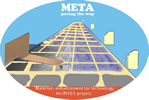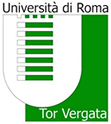 META addresses fundamental challenges related to two types of devices: DNA motherboards (WP1) and Devices based on Interface enhanced conductivity (WP2).
META addresses fundamental challenges related to two types of devices: DNA motherboards (WP1) and Devices based on Interface enhanced conductivity (WP2).
Scope of the project
The two types of devices studied:
1) DNA planar architectures exploitable as “mother boards” for self-assemblage of functional components;
2) Devices based on interface-enhanced charge conductivity.
In the former the localized structuring is based on biological self-assemblage at molecular level, while the latter type of devices is based on extremely fine control of the growth of interfacial layers reached by Pulsed Laser Deposition (PLD); both are characterized at the atomic level by scanning probes (SPM), optical and neutron spectroscopy (OS and NS) and thickness shear mode acoustic methods (TSM), over a wide range of length and time scales (10-10 to 10-7 m, 10-15 to 10-9 s). First-principle modelling provides the necessary insight into the specific interactions driving nanoscale processes such as selective binding and local conductance. Theory and computational simulations of the nanostructured materials, enabled by access to world class computational facilities guides the development throughout the project.


